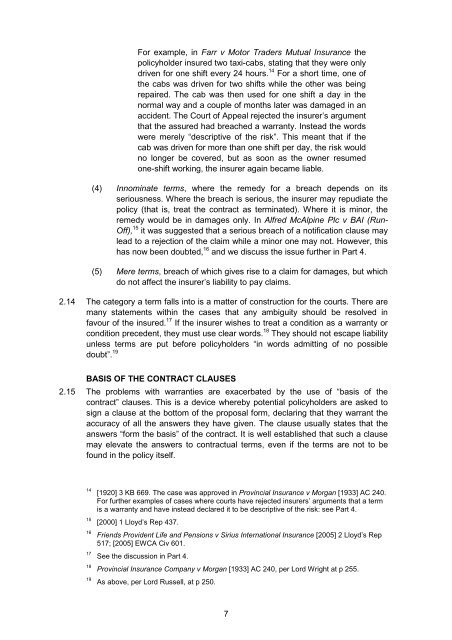Insurance Contract Law Issues Paper 2 Warranties - Law Commission
Insurance Contract Law Issues Paper 2 Warranties - Law Commission
Insurance Contract Law Issues Paper 2 Warranties - Law Commission
You also want an ePaper? Increase the reach of your titles
YUMPU automatically turns print PDFs into web optimized ePapers that Google loves.
For example, in Farr v Motor Traders Mutual <strong>Insurance</strong> the<br />
policyholder insured two taxi-cabs, stating that they were only<br />
driven for one shift every 24 hours. 14 For a short time, one of<br />
the cabs was driven for two shifts while the other was being<br />
repaired. The cab was then used for one shift a day in the<br />
normal way and a couple of months later was damaged in an<br />
accident. The Court of Appeal rejected the insurer’s argument<br />
that the assured had breached a warranty. Instead the words<br />
were merely “descriptive of the risk”. This meant that if the<br />
cab was driven for more than one shift per day, the risk would<br />
no longer be covered, but as soon as the owner resumed<br />
one-shift working, the insurer again became liable.<br />
(4) Innominate terms, where the remedy for a breach depends on its<br />
seriousness. Where the breach is serious, the insurer may repudiate the<br />
policy (that is, treat the contract as terminated). Where it is minor, the<br />
remedy would be in damages only. In Alfred McAlpine Plc v BAI (Run-<br />
Off), 15 it was suggested that a serious breach of a notification clause may<br />
lead to a rejection of the claim while a minor one may not. However, this<br />
has now been doubted, 16 and we discuss the issue further in Part 4.<br />
(5) Mere terms, breach of which gives rise to a claim for damages, but which<br />
do not affect the insurer’s liability to pay claims.<br />
2.14 The category a term falls into is a matter of construction for the courts. There are<br />
many statements within the cases that any ambiguity should be resolved in<br />
favour of the insured. 17 If the insurer wishes to treat a condition as a warranty or<br />
condition precedent, they must use clear words. 18 They should not escape liability<br />
unless terms are put before policyholders “in words admitting of no possible<br />
doubt”. 19<br />
BASIS OF THE CONTRACT CLAUSES<br />
2.15 The problems with warranties are exacerbated by the use of “basis of the<br />
contract” clauses. This is a device whereby potential policyholders are asked to<br />
sign a clause at the bottom of the proposal form, declaring that they warrant the<br />
accuracy of all the answers they have given. The clause usually states that the<br />
answers “form the basis” of the contract. It is well established that such a clause<br />
may elevate the answers to contractual terms, even if the terms are not to be<br />
found in the policy itself.<br />
14<br />
15<br />
[1920] 3 KB 669. The case was approved in Provincial <strong>Insurance</strong> v Morgan [1933] AC 240.<br />
For further examples of cases where courts have rejected insurers’ arguments that a term<br />
is a warranty and have instead declared it to be descriptive of the risk: see Part 4.<br />
[2000] 1 Lloyd’s Rep 437.<br />
16<br />
Friends Provident Life and Pensions v Sirius International <strong>Insurance</strong> [2005] 2 Lloyd’s Rep<br />
517; [2005] EWCA Civ 601.<br />
17 See the discussion in Part 4.<br />
18 Provincial <strong>Insurance</strong> Company v Morgan [1933] AC 240, per Lord Wright at p 255.<br />
19 As above, per Lord Russell, at p 250.<br />
7

















